This article originally appeared in the March 1999 issue of SPIN.
He may be dumb, but he’s not a dweeb. Bryan “Dexter” Holland strides manfully to the edge of a New York City stage, and—holding two cans of beer—launches himself onto a sea of hands. His goal: to carry said beverages back over the thirsty-looking crowd and deliver them to the band’s soundman some 20 yards away. “I’d done it before,” the Offspring‘s 32-year-old singer says later. “But this was going to be the record for distance.”
Barely ten feet into the crowd, the horizontal Holland loses the beers—seized and guzzled by fans. Then he loses his shoes. Then his socks. Then he simply disappears, leaving his bespectacled aide-de-camp, guitarist Kevin “Noodles” Wasserman, squinting out from the stage. After a good five minutes—”It was definitely the record for time,” Noodles reports—Holland reemerges from the club’s antechambers, barefoot.
“That’ll teach me to try that with a New York crowd,” he yells.
On a dime, L.A.’s platinum mosh engine jumps back into its chief metier, the action-packed set of speedy thrash numbers and novelty rock songs. It’s rec-room hardcore in the ’80s West Coast tradition: breakneck tempos, rubber masks, a Larry “Bud” Melman cameo—fun, fun, fun till your daddy takes the beerbong away. While the gigantic hooks of hits like “Self Esteem” and “Come Out and Play” stoke the crowd, an undeniable part of the thrill comes from that combination of self-consciously sophomoric attitude and gleeful loathing that American punk rock perfected.
“You know what?” Holland tells the crowd. “I hate the Backstreet Boys!” The testimony gets a roar of approval and the Offspring tear into the fast-and-loud “Cool to Hate,” a ditty that professes distaste for cheerleaders, jocks, geeks, trendies, freaks, Doc Martens, muscle tees, TV, and, while we’re at it, “you.” Then, after a pause, guitar-tech/percussionist Chris Higgins taps one of the baby doll heads that trigger his sampler and there’s an echt-Offspring moment. Def Leppard counts “Gunter, glieben, glauben,” disembodied hootchie-mamas leer “Give it to me, baby,” and the band locks into the funk-grunge groove of its MTV smash “Pretty Fly (For a White Guy).” What may have begun as a send-up of a white wannabe B-boy comes off here—four samples, three power chords, and one heavy-rotation video later—as a hard-rock salvo against all things “jiggy.” The crowd loses it.
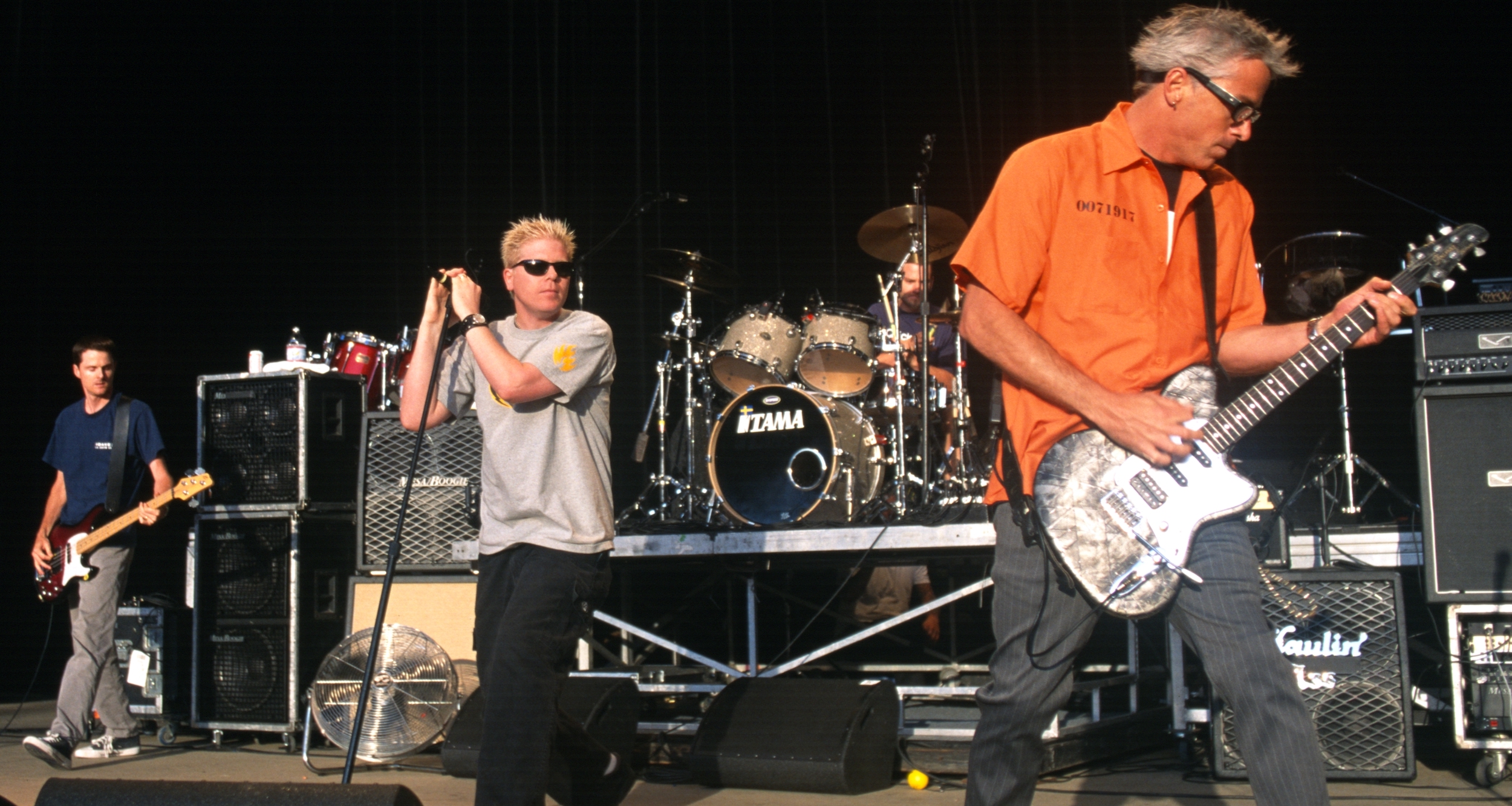
Suddenly, out pops 18-year-old Guy Cohen—the kibbutz-born ersatz playa from the video—and fans surge the stage. A sublimely gawky teen actor, Cohen’s got moves for days. “I do the Running Man, I do the Roger Rabbit,” he says later. “I get down and freak the ground—oh, man, people just explode!” And explode they do as he pulls his leg back behind him, freakin’ it dorkstyle. Cohen has had to bring his own security to Offspring shows and was even chased through the streets of New York earlier today. He finishes his routine with a statement of rockist affiliation—a stagedive—leaving fans to wonder whether they’ve just witnessed a retrenchment of rock values, some new multiculti youthcool, or both. “Thank you, New York,” says Holland after the encore. “Now where are my fucking shoes?”
THE OFFSPRING ARE THAT PUZZLING ANOMALY OF 1999: AN ALTERNATIVE-ROCK band that sells. It was one thing for such a species to thrive in the early ’90s, when anything loud and scuzzy in a Melvins T-shirt seemed state-of-the-art. It’s quite another for them to suddenly pop up betwixt ‘N Sync and Jay-Z, yelping wisecracks over music redolent of Bud and shag carpeting. In a year when fabulous postpunks from the Smashing Pumpkins to Hole failed to capture the mass imagination, here come four 30-ish guys in bowling shirts with their fingers on the pulse of young America.
Somehow, in the middle of impeachment season, Noodles’s ragged guitar and Holland’s treble rants have struck a nerve—possibly a deep one. When the Offspring broke in 1994, punk purist critics wrote them off as hopelessly pop—neither “challenging” nor “dangerous”—mere soundtrack music for extreme-sports videos. But now with their fifth album, Americana, the Offspring have a hit single that actually flirts with one of the last dangerous topics available to a bunch of SoCal whiteboys: race.
The song “Pretty Fly (For a White Guy)” portrays a white kid who “isn’t cool but fakes it anyway,” i.e., acts Black. “It’s really inspired by wannabe gangsters,” Holland says. “Guys who go to malls and get the gangsta rap clothes. Guys on Ricki Lake who won’t listen to their moms.”
It’s a fairly shopworn motif—a staple of daytime TV and Jennifer Love Hewitt movies—but the music takes it in all sorts of new directions. The track rams the band’s first hit, “Come Out and Play,” through the MTV Jams machine. It mixes Latin percussion and ghetto-girl voices. (“We wanted a Rosie Perez type,” Holland says; they settled for two voiceover pros, one of them Welsh and seven months pregnant.) It throws samples at aggro guitars, and features quasi-rap verses that show the rhyme skills you’d expect from someone named Dexter (e.g., “He’s not quite hip / But in his own mind he’s the dopest trip”). The mix is explosive. Even more so when bolstered by its McG-directed video, which, like an earlier Monster Magnet clip, both lampoons and exploits the whole glitzy, dancing-girl overkill of late-’90s rap videos. Wickedly appropriating hip-hop sound and image, “Pretty Fly” sends up way more than just white wannabes. It takes a longtime villain of the Offspring oeuvre—the “trendy asshole”—and locates him in the dominant trend of the moment, which happens to be African-American.
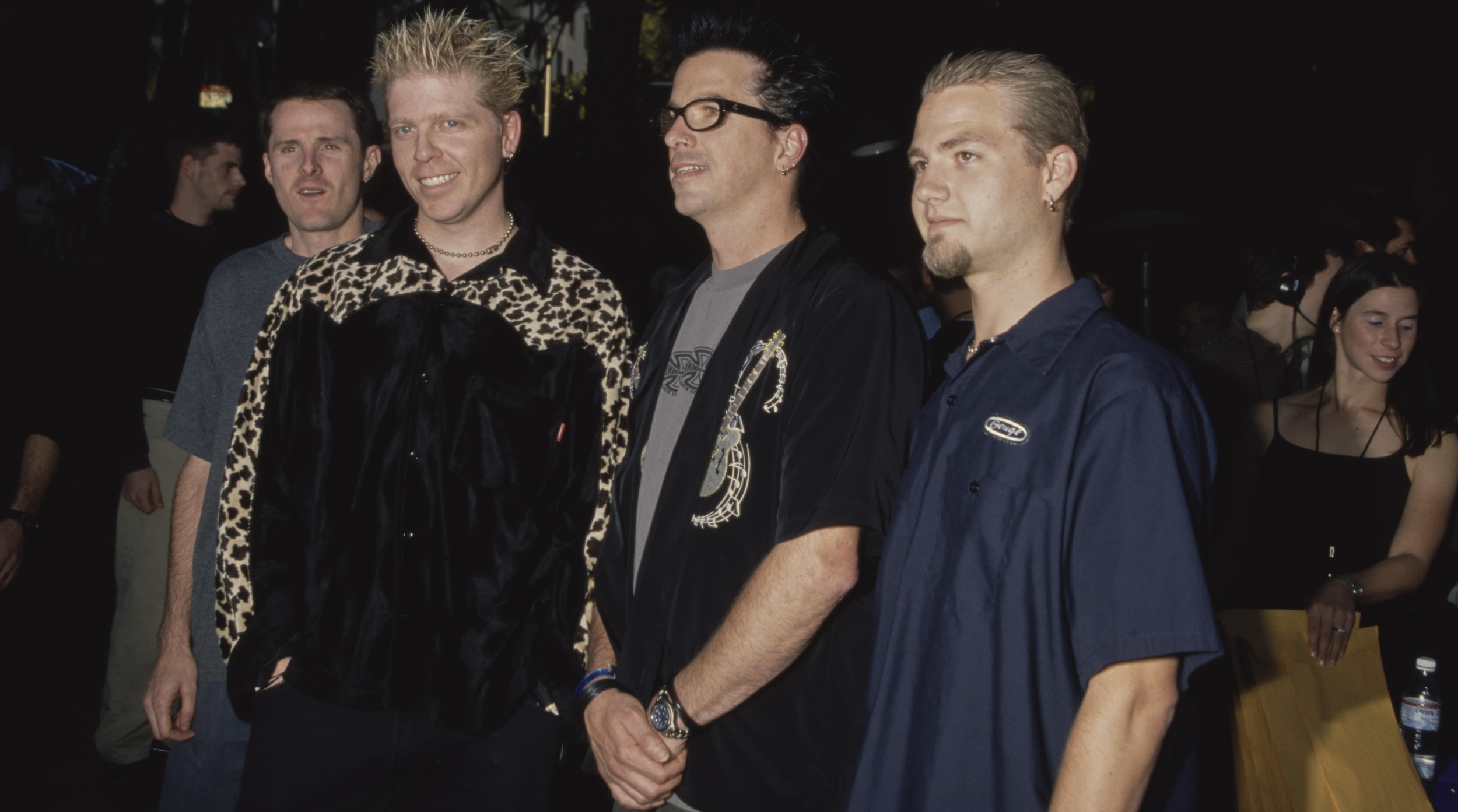
Rest assured, most of Holland’s bile is directed at bands like ‘N Sync and the Backstreet Boys, with their mall-friendly bleaching of street style. “I mean these groups make Hanson look like Rancid,” Holland says. “I really do hate that stuff. Buff white guys singing slow jams.” Holland actually likes some rap—Ice-T, N.W.A, Public Enemy, the Beastie Boys—and is careful not to be misconstrued as anti-hip-hop. “I really didn’t want [the song] to be a Black/white thing because that wasn’t exactly the issue,” he says. “It’s definitely part of it, but it’s more about poseurs of any kind.”
Guy Cohen, who beat out Buffy the Vampire Slayer regular Seth Green for the role of the fly guy in the video, says, “I’m sure lots of people see the video and go, ‘Dang, that guy’s cool.’ I was watching MTV, and one of the ‘N Sync guys had the same Fubu jersey I wore in the video. The Offspring didn’t even realize it, but we were making fun of the biggest teeny-bopper group there is.”
“‘Pretty Fly’ is a reaction,” Tom Calderone, senior vice president of music and talent at MTV, says more generally. “The Offspring were able to take hip-hop, an incredibly strong musical force, and comment on it on so many different levels. It’s a great reflection of where the times are at right now.” And where the times are at right now is boy groups, Jewel, and most of all, R&B—things not rock. Cast your mind back 20 years and you’ll realize the Offspring’s latest gesture is quite familiar. It’s a cry from the marginalized white rock sector against an ascendant culture of urban fakery: Poseurs! Trendies! Wussies! Phonies! What we may have here, ladies and gentlemen, is the great premillennial Disco Sucks song.
CHRISTMAS IN ORANGE COUNTY. A HOLIDAY STAMPEDE AT DISNEYLAND JUST SENT several people to the hospital and the malls are almost out of Furbys. Past a traffic-choked strip mall and down an industrial parkway we find Nitro Records, indie punk label and unofficial HQ of the Offspring. Inside, Christmas carols play on the oldies station and friendly young men and women wearing Doc Martens and Vans sit typing or stuffing envelopes. A framed photo of the Nitro-sponsored West Corona Little League team shares wall space with posters for Social Distortion and the Damned.
Holland and Offspring bassist Greg Kriesel started Nitro in 1995, and the label is currently home to such neo-punk upstarts as Guttermouth and the Vandals. Their posters fight for attention with ten old-school video games: Defender, Asteroids, and other classics occupy the adjoining hangar, next to T-shirt boxes and instrument cases. Upstairs, Holland’s office boasts campy executive touches: a huge tropical fish tank and one of those desk ornaments with the hanging silver balls that click back and forth. “I’m really into office toys,” Holland says, setting the spheres in motion. As the balls click away, the men of Offspring sit back and reveal the weighty global vision behind the album Americana.
“Actually, we were going to title it You’re Too Fat to Make Porn,” says Noodles. “That was right off of Springer, I think.” The 35-year-old guitarist has a black-dyed, rectangular haircut and super-thick glasses, very Metal Shop Teacher circa 1978. When a caller to a radio show asked him what superpower he’d most like to have, Noodles answered, “I’d settle for some decent eyesight.” His T-shirt says WHITE TRASH under a turnpike-sign-style silhouette of a trailer.
Holland sits across from him, his long legs splayed out on either side of the chair. Shorn of the cornrows Courtney Love once dubbed the “worst hair in rock,” Holland has a spiky blond Billy Idol-ish crew cut and ice-blue eyes, lending him a slight resemblance to the toothy actor Gary Busey. Even in silver creepers, he is so clean-cut and all-American-looking the nickname “Skippy” seems as apt as “Dexter.”
“It wasn’t like we sat down and said, ‘Okay, we want to make this really cool social statement,’” Holland says in a twangy SoCal accent. “We’d done a few songs-‘Pretty Fly (For a White Guy),’ ‘The Kids Aren’t Alright,’ ‘Why Don’t You Get a Job’–then we realized a theme. It was more of a passive thing.”
Befitting its earlier title, Americana is a spirited harangue on deadbeat roommates, psychobabbling girlfriends, felonious buddies, trendy tattoos, four-by-fours—the whole morass of tacky, polyglot American culture as experienced from a suburban sofa. In the title track, Holland sings that his nightmare is coming true: “Where culture’s defined by the ones least refined.” In the Jerry Springer-ishly titled sing-along “Why Don’t You Get a Job,” he sings, “She sits on her ass / He works his hands to the bone.” In “She’s Got Issues,” he bemoans a girlfriend who “thinks she’s the victim but she takes it all out on me.” It’s the cry of the alienated white dude and—to a sizable demographic—it rocks.
Gathered in Holland’s office, the members of Offspring seem to represent that demo quite successfully. Kriesel, the skinny, short-haired former high-school trackmate of Holland, has a quiet intensity and, according to Guy Cohen, “always looks like he’s studying for finals.” Ron Welty, the sole member without kids, is also the one with the most pronounced surfer drawl. He is only five years out of his job at a frozen yogurt shop. While Smash‘s 5.3 million sales have bumped them up several tax brackets, the four have lives befitting modestly successful software entrepreneurs more than rock stars. Instead of lavish chalets, Holland and Kriesel put their first royalty checks into starting Nitro. Holland recently got a single-engine plane, but he still drives the same 1979 Toyota truck the band toured in a decade ago. Kriesel has the X-Files-ish habit of “investigating crop circles.” Noodles and Welty like to snowboard. They all seem very much like the smart, middle-class suburban kids they were two decades ago—in some cases, disturbingly similar.
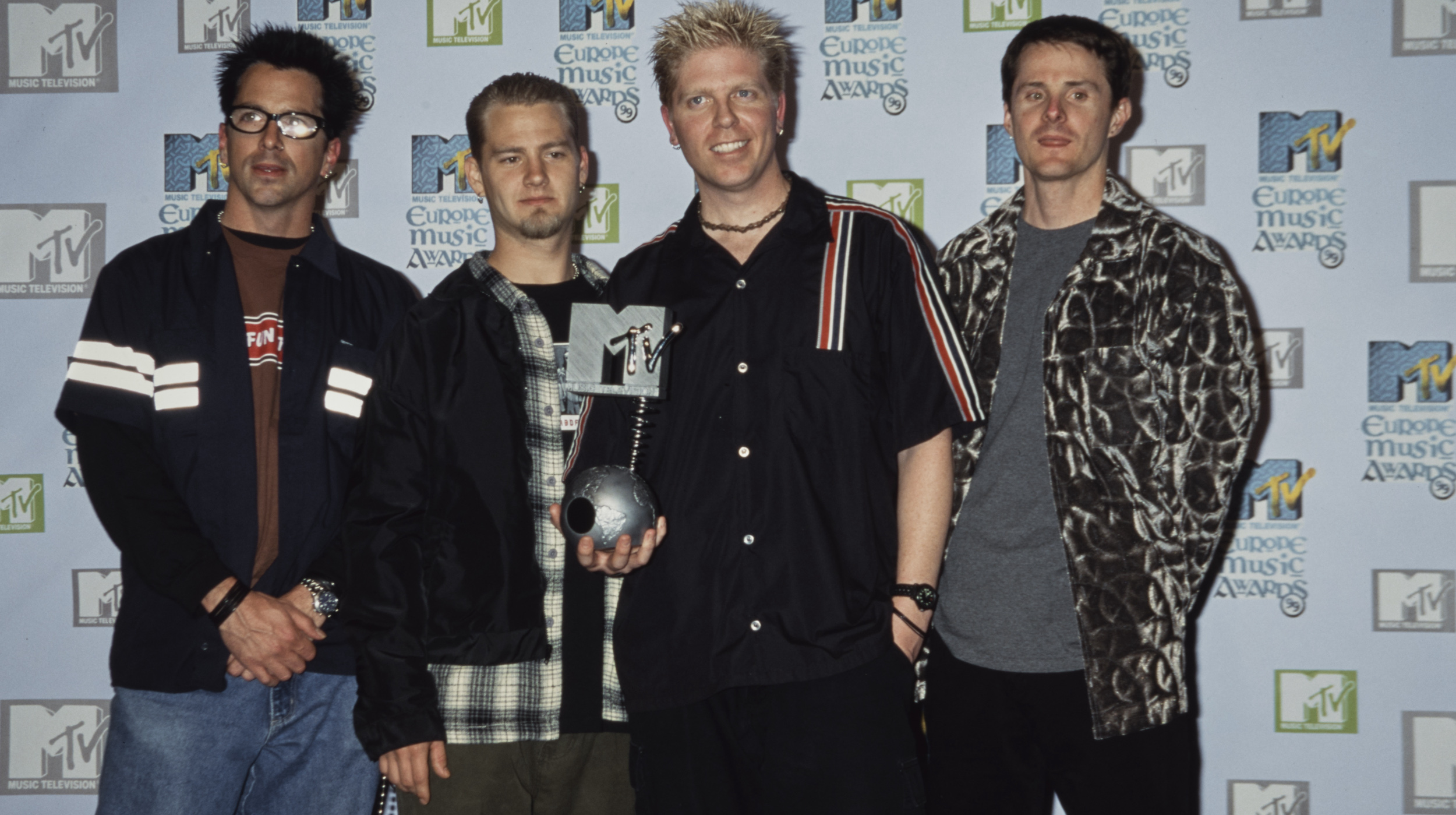
Holland, for instance, nurtures a perverse interest in entry-level employment. He’s applying for a job at McDonald’s. “I think it would be a great experience,” he says, seriously. He rifles through some papers and finds the application form, partially filled out. Next to NAME, hand-printed block letters say “Dexter Dufresne”–a fake surname. ARE YOU 18 OR OLDER? it reads “Yes.” ARE YOU LEGALLY ABLE TO BE EMPLOYED IN THE U.S.? “Yes.”
TWO MOST RECENT JOBS: “Rock Star,” says Noodles, laughing, “and Student.”
All four Offspring members have done their time in academia, although former class valedictorian Holland is probably the most schooled—just a dissertation away from a molecular biology Ph.D. at USC. This is hardly a contradiction, with everyone from Bad Religion guitarist Brett Gurewitz—head of Offspring’s former label, Epitaph—to Descendents singer Milo Aukerman having done some form of postgraduate work. In fact, Holland’s school years indirectly provided the Offspring with song fodder, When he wasn’t cloning viruses, Holland was living in South Central: eating tacos, witnessing drive-bys, and cruising the freeways—finding an LA. dystopia he later made radio-friendly.
The freeway shooter in Smash‘s “Bad Habit” was “basically me talking about my old car,” Holland says. “I had a 1980 Chevette that wasn’t really able to reach freeway speeds. As soon as I hit the on-ramp, I’d floor it, and by the time I hit the freeway, I was going about 45. So I was flipped off like once or twice a week. I think it was kind of in my mind, getting revenge.” The album’s hit “Come Out and Play” was inspired by the violent high-school gangsters he’d seen in South Central. In Holland’s hands, however, these inner-city snapshots came off like a Wild West suburbia. This transmogrification proved to be a crucial element in the Offspring’s success.
While “Come Out and Play”‘s clipped bursts of rhythm and sound-bite showed a subliminal rap influence, rock guitars and Holland’s high-pitched recess yell made the whole thing total teenybopper rock: raw and candy-coated at the same time. That the exact same mix’n’match technique made “Pretty Fly” a hit in an utterly different musical environment suggests that the Offspring have developed something very much like a magic formula: Take a Latin-rock classic—War’s “Low Rider” in the case of “Come Out and Play”; Santana’s “Oye Como Va” in “Pretty Fly.” Put butch metal guitars over it. Add some catchy vocal sound bites. Mix into bite-size chunks. “I like the idea of combining different elements,” says Holland. “You just start building in stuff.”
Herein lies the sweetest irony of these authors of “Pretty Fly (For a White Guy).” Their piecemeal song construction is right from the sampler age. They load their songs with percussion and rhythm. They have catchy sound bites and vocal trade-offs. Their lyrics are precise and realistic. They even sold more than five million records on an independent label. Minus a few crucial details, the Offspring are a rap group.
The whitest rap group ever. Dave Jerden, the band’s producer since Ixnay on the Hombre, explains the Offspring’s mass appeal in terms of sonics and demographics. “Dexter’s got the classic South Bay voice,” he says. “It goes back to Jan and Dean and the Beach Boys. The South Bay is a real whitebread place and all the bands—from the Beach Boys and Jan and Dean through Social Distortion and the L.A. punk thing—they all have that voice.” Jerden calls it a “melting-pot voice,” and traces its unique timbre and dialect back to a postwar migration from points all over the United States to Orange County. “It isn’t a Southern sound, it isn’t a New York sound,” he says. “It’s a sound that you can’t quite put your finger on, but it comes from the whole country.”
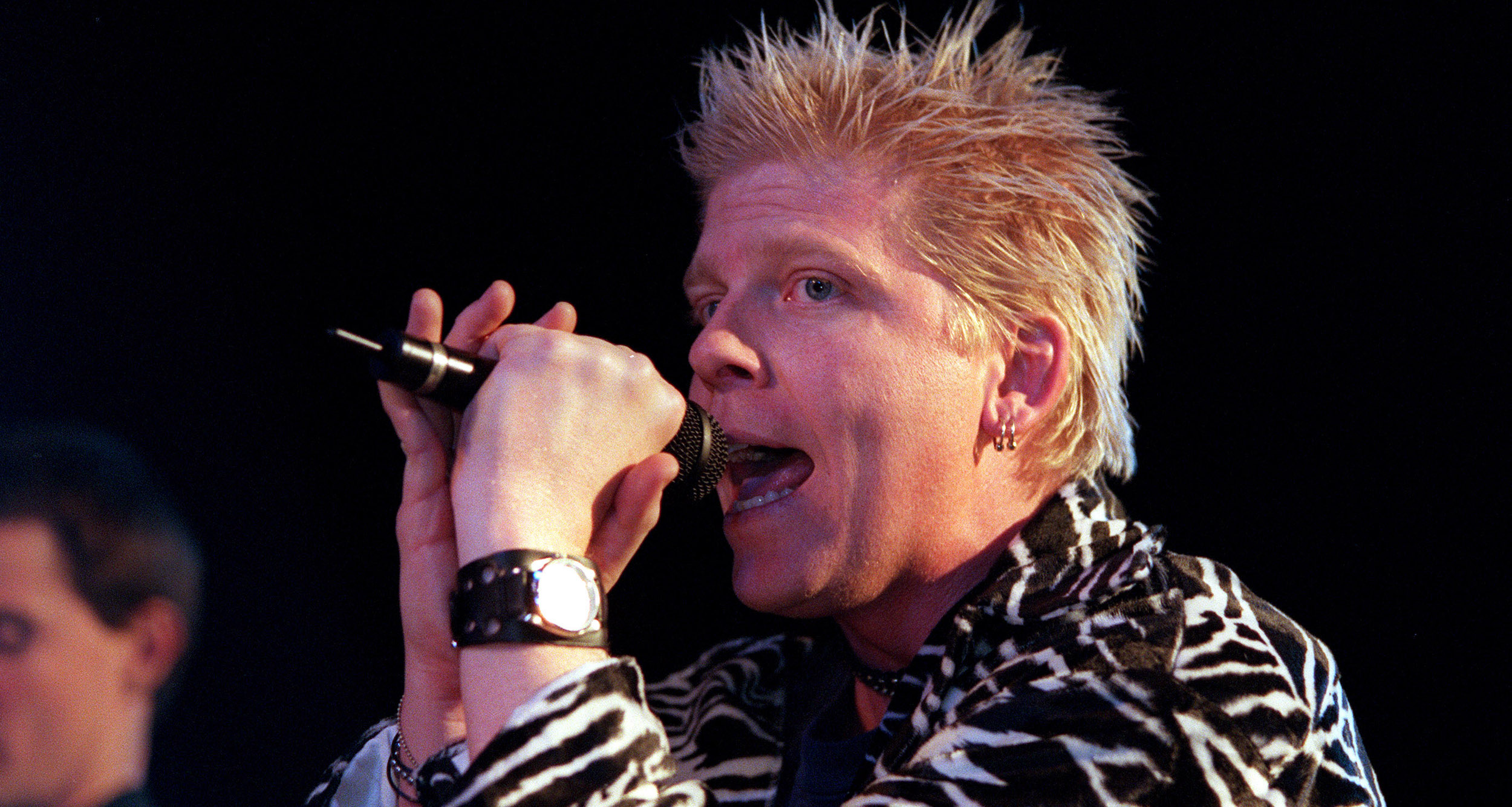
IF ORANGE COUNTY IS A MELTING POT, YOU’D NEVER KNOW TO LOOK AT IT. IN FACT, the region tends to specialize in certain extremes. In the ’80s, for instance, Orange County enjoyed an unusually harmonious relationship between subculture and mainstream: It was home to both Reagan nuts and surf-Nazi skinheads. In the front seat of a Mitsubishi Montero, Holland sips some gourmet coffee as we cruise past points of local interest. We make a right on a street called Heil. “Like Heil Hitler,” he cracks. “Appropriate for this place.”
We drive past fitness centers, ocean inlets, and mini-malls—”the cornerstone of Orange County life,” Holland observes. Then we pull into Garden Grove, a pleasant neighborhood of Mike Brady homes, each barely ten yards apart. The occasional trailer or mobile home sits alongside El Caminos and Toyotas. This palm-tree-lined neighborhood is where Holland, Kriesel, and Noodles grew up punk.
The first record Holland ever owned was the Jackson 5’s “Dancing Machine.” The first he ever bought was the Flying Lizards’ art-punk single “Money.” Shortly thereafter, his older brother brought home a punk compilation produced by KROQ’s DJ Rodney Bingenheimer and Holland’s extracurriculars were decided. “Black Flag, the Circle Jerks, the Adolescents,” Holland remembers. “I just loved it immediately.” Holland’s taste was formed by not just punk, but local punk. Unlike many rock fans who name their first concert experiences as Kiss or Meat Loaf, Holland names his as “probably Joe Martinez, or Mike Sheehan”—friends in a local punk band who played at backyard parties.
One night in 1983, Holland and his high-school track buddy Kriesel went to Irvine to see a Social Distortion show. The concert was oversold and prompted a riot, leaving them with nothing to do but scam beer and hang out at a friend’s house. Peeing in the bushes, they decided to form a band. “I’m like, ‘Well, I’ll play guitar,’” Holland says. “And Greg was like, ‘I’ll be bass.’” Months later, they enlisted Noodles, who couldn’t play guitar but was old enough to buy beer. He was locally known as the school’s custodian. “To us, he was always this guy sweeping up wearing a Descendents T-shirt,” says Rick Shipley, now a Nitro employee. Welty joined soon after and the line-up was solidified. Keeping with the punk tradition of wacky nicknames—Lee Ving, Darby Crash—Bryan Holland took the name of Dexter and the band chose the name the Offspring, showing more than a slight debt to the Descendents. They recorded their first 7-inch and pressed a thousand copies of it under the made-up label name Black Label, “because that was the beer we were drinking massively at the time.”
For some reason, songwriting duties had fallen to Holland. “See, when you start a punk band you gotta do about three or four obligatory songs,” Holland recalls. “First the anti-cop song. Then the anti-war song. Then the death song. And then the alienation, my-girlfriend-is-a-bitch song.” Holland started with the cop song, a little number called “Police Protection.” “It was probably way-influenced by the Dead Kennedys at that time.” He tries to remember more lyrics. “It was something like, ‘Smash heads, get tough, don’t take any shit’…I dunno, something about doughnuts.”
By the time the Offspring got started, magazines like Flipside and Maximum Rock’n’roll had begun to form a politburo of what was and wasn’t punk. The scene became smaller and its borders more rigidly policed. When the Offspring played with so-called peace punks Final Conflict, the club was rushed by skinheads, who, after all, were ideologically opposed to peace. “And Noodles,” Holland says with a laugh, “being the peacemaker that he is, tried to say ‘Can’t we just all get along?’” Getting between the two groups, he was stabbed in the shoulder.
Now a full decade into it, the Offspring’s faithfulness to their hardcore origins seems distinctive. While their oft-gimmicky studio construction blends well with the rap age, their sense of topic and form comes straight from the L.A. tradition of snide sideline pundits like the Adolescents, Suicidal Tendencies, and the Angry Samoans. Instead of spooky poetics about heart-shaped boxes and black hole suns, Holland’s songs concern subjects straight from a passed study-hall note. “I think part of the reason people identify with what we’re doing is because I write songs about regular real things,” Holland says as we drive past a former heavy-metal venue, now a strip club opened by porn star Jenna Jameson. “I guess you could say the same thing about Bruce Springsteen, but I don’t understand that guy at all.” Plus Springsteen doesn’t use words like “rad” and “dweeb.”
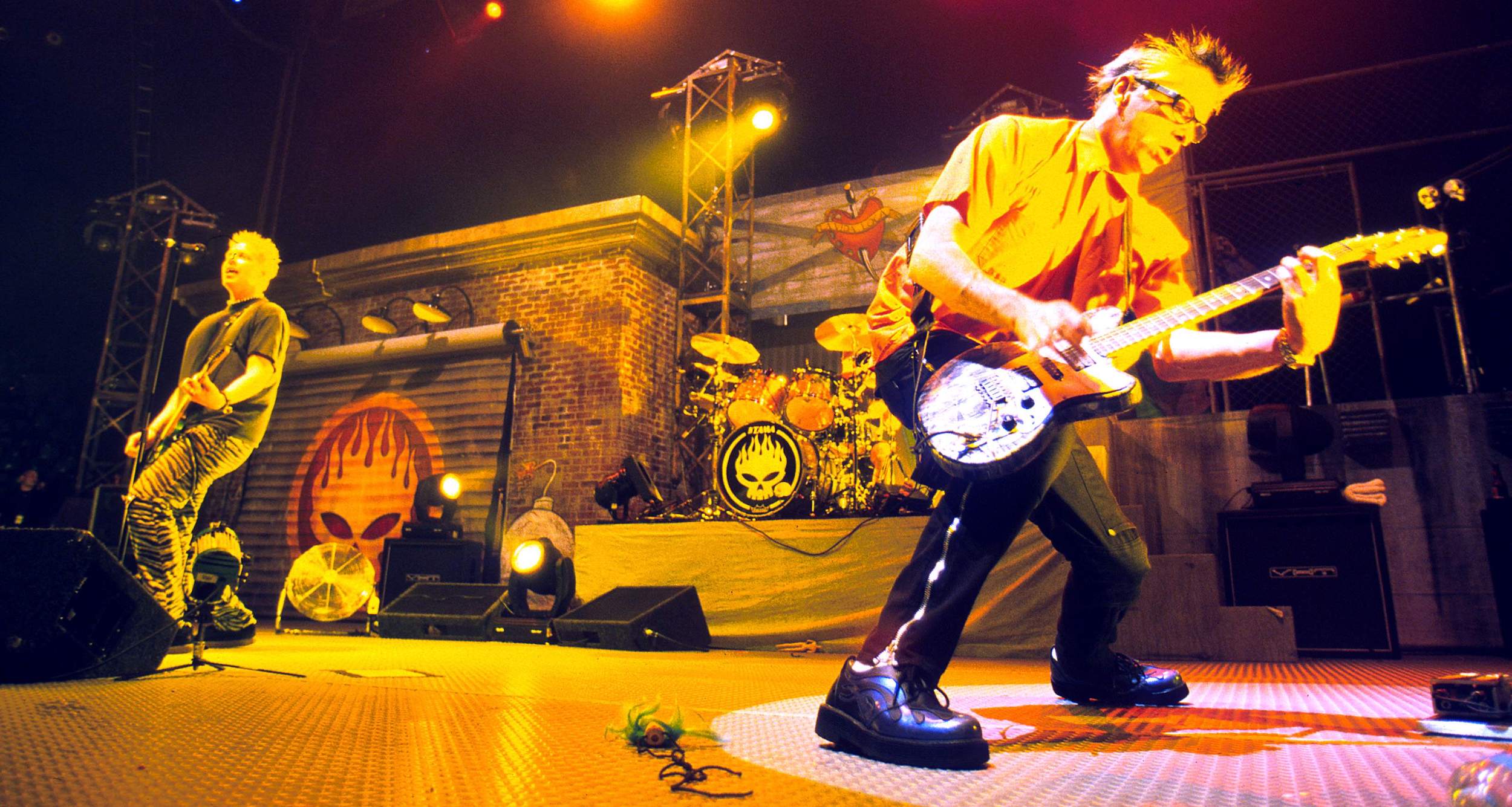
HOLLAND AND I HAVE JUST SPENT THE AFTERNOON WITH JENNY JONES AND RICKI Lake. We commandeered a friend’s bungalow in Huntington Beach and took in the whole panorama of trashy daytime TV: Jenny’s makeovers, Ricki’s ex-gays, ads for personal-injury lawyers. Now we’re driving along the Pacific Coast Highway, and a mother is whining on the radio about a son with ADD. “See,” Holland, who has an 11-year-old daughter, says sardonically, “it’s not that she has a kid that’s hyper and she can’t control him. It’s that he suffers from…this affliction, and here’s the initials.”
This is a big theme in the Holland oeuvre: personal responsibility. “A song like ‘She’s Got Issues’ is saying, ‘Hey, come on, let’s just take some personal responsibility for who we are,— he says, “instead of blaming our actions or behavior on things that aren’t really relevant.”
While he fingers psychobabble and recoveryspeak for some of this moral laxness, Holland isolates another cause: “political correctness.” “It’s gone so far now that it’s almost stifling. A lady sues McDonald’s because she spilled coffee on herself, because the cup didn’t say THIS COFFEE’S HOT. The street I grew up on had, like, one stop sign when I was a kid. Now there’s four stoplights in a hundred-yard distance. That kind of stuff gets to the point where you want to move to Montana or something. Get an electrified fence and a shotgun.” Before I can suggest the nickname Dexter McVeigh, Holland cuts himself short.
“Of course, there’s a flip side,” he says. “I mean, it’s great that you can express what you think. We have more freedoms than anywhere in the world.”
Holland, a registered Democrat, denies any reactionary affiliations. He’s pro-choice, pro-environmentalism, and even enlisted erstwhile mayoral candidate Jello Biafra for a guest rant on lxnay. “If there’s one kind of unifying theme to our music,” says Holland, “it’s that you should live life according to what you think is the right way to do it.”
All righteous sentiments. Not that the Offspring are taking anything too seriously. An extended “dance” version of “Pretty Fly” was offered to rap stations. Their Christmas concert for L.A.’s KROQ featured dwarves dressed as Santa’s elves, a New Wave medley, and a rendition of “Pretty Fly” starring the most notorious pretty-fly white guy in history, Vanilla Ice. “He’s like William Shatner now,” says Higgins. “He’s like not afraid to fuckin’ poke fun at himself.” Neither is the Offspring, a group formed under the strict moralism of mid-’80s punk, puckishly surviving in a world of Boyzone and Dawson’s Creek.
“Kids come up to me—really young kids—and go, ‘This is my first concert ever,’ says Noodles. “‘This is my first time I ever went in the slam pit.’” He laughs. “Initially it rubs you as kinda weird. It makes you feel like you’re the New Kids on the Block. But then you think, actually, it’s pretty cool, you know? Hey, there’s a lot worse things.”

Leave a comment